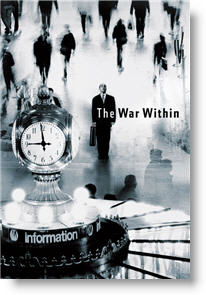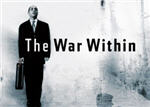The War Within
 for violent images, some language and nudity.
for violent images, some language and nudity.
Reviewed by: Kenneth R. Morefield, Ph.D.
CONTRIBUTOR
| Moral Rating: | Better than Average |
| Moviemaking Quality: |
|
| Primary Audience: | Adults |
| Genre: | Drama |
| Length: | 1 hr. 30 min. |
| Year of Release: | 2005 |
| USA Release: |
September 30, 2005 (wide) |
| Featuring |
|---|
| Ayad Stehle-Akhtar, Firdous Bamji, Sarita Choudhury, Nandana Sen, John Ventimiglia |
| Director |
|
Joseph Castelo |
| Producer |
| Mark Cuban, Todd Wagner, Tom Glynn |
| Distributor |
| Magnolia Pictures |
Plot summary
Three years after being detained and tortured, Hassan (Ayad Akhtar), a Pakistani engineering student, joins a terrorist cell operating in the United States. While staying at the house of an old friend (Firdous Bamji as Sayeed), Hassan begins to struggle with his own decisions. It received an R-rating for violence and nudity; neither I nor my spouse could recall which scene contained nudity, so it must have been pretty brief.
“You have heard that it was said, “Love your neighbor and hate your enemy.’ But I tell you, love your enemies and pray for those who persecute you, that you may be children of your Father in heaven. He causes his sun to rise on the evil and the good, and sends rain on the righteous and the unrighteous. If you love those who love you, what reward will you get? Are not even the tax collectors doing that? And if you greet only your own people, what are you doing more than others? Do not even pagans do that? Be perfect, therefore, as your heavenly Father is perfect” (Matthew 5:43-47).
It’s always a risky thing to write a rave review. We live in a world in which it is easier to be a detractor than an advocate. Call a film “good,” and people might go see it. Call a film “great,” and you not only raise expectations, you pretty much guarantee that those who disagree will let you hear about it. So I try to avoid gushing as a rule, and I try to avoid this word like the plague: “The War Within” is a masterpiece.
Percy Shelley wrote in “A Defence of Poetry”:
“A man, to be greatly good, must imagine intensely and comprehensively; he must put himself in the place of another and of many others; the pains and pleasures of his species must become his own […] Poetry strengthens that faculty which is the organ of the moral nature of man, in the same manner as exercise strengthens a limb.”
To truly love our neighbor, we must be able to imagine what it is to be in his shoes; poetry strengthens us morally because it strengthens our imaginative ability to identify with and in some tiny way understand those with whom we differ. That knowledge is the seed, but only the seed, from which love of our neighborand perhaps even our enemy—can sprout.Part of the power of “The War Within” is that it never stuffs its truth down your throat; it trusts you to make the observations and connections necessary to contextualize the action so that you experience a work of art rather than receive a lecture.
No film in recent memory better exemplifies film’s power to help us vicariously walk with someone whose experiences are so alien to our own than “The War Within”. The most consistent criticism I’ve heard or read is that Americans may simply not be ready for or interested in a film from a terrorist’s point of view. I can understand that view, but I’m not sure that the film is really about terrorism. It’s about internal conflict. The point of view from that the narrative follows is indeed that of Hassan, but I don’t think the film’s point of view is identical to his. The point of view of an artist or a narrative work is often different from that of the protagonist of the work.
Also, Hassan’s point of view is not that of the self-assured, confident, martyr-zealot but rather that of the anguished self-doubter seeking truth or meaning. Hassan’s view has little patience for Sayeed’s anti-American friend who is openly and confidently fundamentalist in his rhetoric. “Death is real,” Hassan says, “poverty is real;” he resents those who use incidents like the one he has undergone to develop an ideology of platitudes while eschewing any personal responsibility to alleviate the pain of those who are suffering.
This conversation provides the frame for a later one Hassan has with a partner after one plot has failed to materialize. “We have to do something,” his friend says. “We could always blow ourselves up on a bus like Palestinians,” Hassan replies. There is bitterness in that statement, but it is darkly humorous, in its own way, and ultimately very telling. It suggests to me that Hassan’s strongest motivation, finally, is neither hatred nor zealotry, but a spiritual despair. What can I possibly do? I must love my brother. I must purify myself. I must obey God. I must strive against evil. How can I do these things?
Normally, I feel fortunate if I can think back over a film and remember two or three scenes that remain etched in my memory after the narrative is completed. “The War Within” has a half dozen:At one point in the film a driver for the company Hassan is temporarily working with speaks about how one used to be able to use the twin towers as a reference point if one were to get lost in the city. Now? Well now, if he gets lost Hassan should call someone. Absent a reference point or anchor, those of us who are lost can only depend upon some sort of human connection.
That conversation returned to me later in the film as Hassan was praying and he was being paged by Duri, Sayeed’s sister to whom Hassan is increasingly drawn. Of course, the calling of the name was also reminiscent of Genesis, with God calling out to Adam, Where are you?In another scene, Hassan tries to write a letter to Sayeed and his family explaining what he is setting out to do. He does not think they will understand. He does not want to hurt them, although he knows that he will. Ignorance, he tells them, is not the same as innocence. That phrase returned to me when Sayeed fell under suspicion from another quarter.
There is another moment in which Hassan and Sayeed talk in a restaurant. Sayeed knows his friend has been deeply wounded by some experience, and he is trying desperately to be a loving friend. He senses the internal struggle in Hassan, suggests that perhaps it is providential that Hassan has been brought to his home. There is something here Hassan needs to see, to feel. It is a painful moment for Hassan who sees the possibility for healing and peace as a temptation that might allow his troubled conscience to turn aside from his selected path.
There is a moment, too, when Sayeed makes a decision while his wife tries to talk him out of it. At first, one thinks she is asking him to protect their family friend. The urgency of his reply is telling, and, upon reflection, we come to realize that she and he are talking about protecting themselves because they know even better than we do what the consequences of making that call will be.
There is a moment in which Hassan takes Sayeed’s son to the mosque to pray. The sermon they hear is one that is no different from one millions of Christians will hear across the world on any Sunday. How can we know the will of God? How can we deal with the challenge of life’s daily distractions, disappointments, temptations? How can we purify ourselves, make ourselves living sacrifices?
Perhaps one of the most poignant scenes is when Duri emerges from a dressing room in a traditional outfit and we, like Hassan, are caught off guard by her beauty. For the tiniest fraction of a moment we have hope. We want him to choose life, not just the lives of others but his own life. We want him to choose to accept the possibility that there is healing for brokenness, a home for the dispossessed and hopeless. Instead, Hassan ends up hurting her more perhaps more cruelly and definitely more personally than anyone else in the film. This, too, is a message worth meditating on: inevitably when we turn to violence, it is impossible to protect the one’s we love or keep them free of its consequences. Finally, there is a showdown not between enemies but between brothers in faith: “I’m doing the will of God” Hassan tells Sayeed. “What God?” Sayeed asks.
That “The War Within” does not assume the answer to that question—that it strikes a note of mourning rather than anger—allows us to empathize with Hassan even if we do not agree with nor even understand him. Early in the film, a Muslim sharing a cell with Hassan calls him brother, a title which Hassan rejects. His brother feeds him and, after Hassan is tortured, places a Koran in Hassan’s empty and groping hand.
“Suppose a brother or sister is without clothes and daily food. If one of you says to him, “Go, I wish you well; keep warm and well fed,’ but does nothing about his physical needs, what good is it? In the same way, faith by itself, if it is not accompanied by action, is dead” (James 2:15-17).
“The War Within” is a film of exceptional insight and power. Despite its subject matter, it is less political than spiritual, less of an angry polemic than a tragic portrait. Despite the scope of the material, director Joseph Castelo is in control at each moment, never sacrificing the mounting dramatic tension of the narrative to get a quick, knee-jerk response. As a result, the powerful images and scenes accumulate, increasing exponentially in power and heartbreak. In describing the film, my wife used the term “Shakespearean”.
That’s high praise indeed.
It’s deserved.
My Grade: A Violence: Moderate / Profanity: None / Sex/Nudity: Minor
See list of Relevant Issues—questions-and-answers.


PLEASE share your observations and insights to be posted here.

